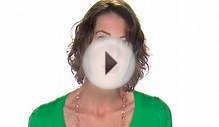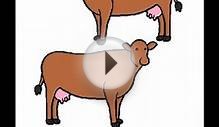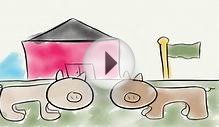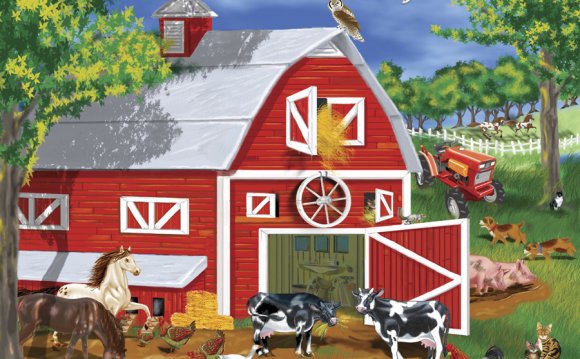
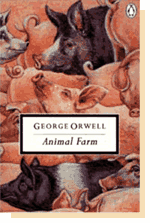 Index
Index
Summary (below)
Summary
The story takes place on a farm somewhere in England. The story is told by an all-knowing narrator in the third person. The action of this novel starts when the oldest pig on the farm, Old Major, calls all animals to a secret meeting. He tells them about his dream of a revolution against the cruel Mr Jones. Three days later Major dies, but the speech gives the more intelligent animals a new outlook on life. The pigs, who are considered the most intelligent animals, instruct the other ones. During the period of preparation two pigs distinguish themselves, Napoleon and Snowball. Napoleon is big, and although he isn't a good speaker, he can assert himself. Snowball is a better speaker, he has a lot of ideas and he is very vivid. Together with another pig called Squealer, who is a very good speaker, they work out the theory of "Animalism". The rebellion starts some months later, when Mr Jones comes home drunk one night and forgets to feed the animals. They break out of the barns and run to the house, where the food is stored. When Mr Jones sees this he takes out his shotgun, but it is too late for him; all the animals fall over him and drive him off the farm. The animals destroy all whips, nose rings, reins, and all other instruments that have been used to suppress them. The same day the animals celebrate their victory with an extra ration of food. The pigs make up the seven commandments, and they write them above the door of the big barn.
They run thus:
- Whatever goes upon two legs is an enemy.
- Whatever goes upon four legs, or has wings is a friend.
- No animal shall wear clothes.
- No animal shall sleep in a bed.
- No animal shall drink alcohol.
- No animal shall kill another animal.
- All animals are equal.
Symbolism/Interpretation
The novel Animal Farm is a satire of the Russian revolution, and therefore full of symbolism. Generally, Orwell associates certain real characters with the characters of the book. Here is a list of the characters and things and their meaning:
Mr Jones: Mr Jones is one of Orwell's major (or at least most obvious) villain in Animal Farm. Orwell says that at one time Jones was actually a decent master to his animals. At this time the farm was thriving. But in recent years the farm had fallen on harder times and the opportunity was seen to revolt. The world-wide depression began in the United States when the stock market crashed in October of 1929. The depression spread throughout the world because American exports were so dependent on Europe. The U.S. was also a major contributor to the world market economy. Germany along with the rest of Europe was especially hard hit. The parallels between crop failure of the farm and the depression in the 1930s are clear. Only the leaders and the die-hard followers ate their fill during this time period. Mr Jones symbolises (in addition to the evils of capitalism) Czar Nicholas II, the leader before Stalin (Napoleon). Jones represents the old government, the last of the Czars. Orwell suggests that Jones was losing his "edge". In fact, he and his men had taken up the habit of drinking. Old Major reveals his feelings about Jones and his administration when he says, "Man is the only creature that consumes without producing. He does not give milk, he does not lay eggs, he is too weak to pull the plough, he cannot run fast enough to catch rabbits. Yet he is lord of all the animals. He sets them to work, he gives back to them the bare minimum that will prevent them from starving and the rest he keeps for himself." So Jones and the old government are successfully uprooted by the animals. Little do they know history will repeat itself with Napoleon and the pigs.
Old Major: Old Major is the first major character described by Orwell in Animal Farm. This "pure-bred" of pigs is the kind, grandfatherly philosopher of change - an obvious metaphor for Karl Marx. Old Major proposes a solution to the animals desperate plight under the Jones "administration" when he inspires a rebellion of sorts among the animals. Of course the actual time of the revolt is untold. It could be the next day or several generations down the road. But Old Major's philosophy is only an ideal. After his death, three days after the barn-yard speech, the socialism he professes is drastically altered when Napoleon and the other pigs begin to dominate. It's interesting that Orwell does not mention Napoleon or Snowball at any time during the great speech of old Major. This shows how distant and out-of-touch they really were; the ideals Old Major proclaimed seemed to not even have been considered when they were establishing their new government after the successful revolt. It almost seems as though the pigs fed off old Major's inspiration and then used it to benefit themselves (an interesting twist of capitalism) instead of following through on the old Major's honest proposal. This could be Orwell's attempt to dig Stalin, whom many consider to be someone who totally ignored Marx's political and social theory. Using Old Major's apparent naivety, Orwell concludes that no society is perfect, no pure socialist civilisation can exist, and there is no way to escaping the evil grasp of capitalism. (More on this in the Napoleon section.) Unfortunately, when Napoleon and Squealer take over, old Major becomes more and more a distant fragment of the past in the minds of the farm animals.
Napoleon: Napoleon is Orwell's chief villain in Animal Farm. The name Napoleon is very appropriate since Napoleon, the dictator of France, was thought by many to be the Anti-Christ. Napoleon, the pig, is really the central character on the farm. Obviously a metaphor for Stalin, Comrade Napoleon represents the human frailties of any revolution. Orwell believed that although socialism is good as an ideal, it can never be successfully adopted due the to uncontrollable sins of human nature. For example, although Napoleon seems at first to be a good leader, he is eventually overcome by greed and soon becomes power-hungry. Of course, Stalin did, too, in Russia, leaving the original equality of socialism behind, giving himself all the power and living in luxury while the common peasant suffered. Thus, while his national and international status blossomed, the welfare of Russia remained unchanged. Orwell explains, "Somehow it seemed as though the farm had grown richer without making the animals themselves any richer-except, of course for the pigs and the dogs." The true side of Napoleon becomes evident after he slaughters so many animals for plotting against him. He even hires a pig to sample his food for him to make certain that no one is trying to poison him. Stalin, too, was a cruel dictator in Russia. After suspecting many people in his empire to be supporters of Trotsky (Orwell's Snowball), Stalin systematically murdered many. At the end of the book, Napoleon doesn't even pretend to lead a socialist state. After renaming it a Republic and instituting his own version of the commandments and the Beasts of England, Comrade Napoleon quickly becomes more or less a dictator who of course has never even been elected by the animals.
RELATED VIDEO
